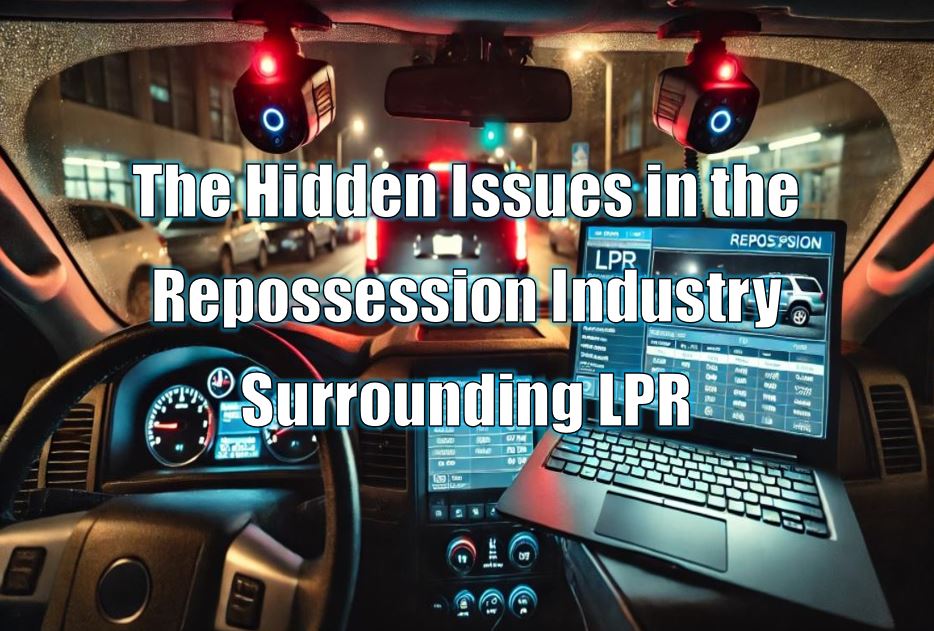The Hidden Issues in the Repossession Industry Surrounding LPR
The repossession industry needs more accountability and open competition.
Guest Editorial
The repossession industry faces significant challenges related to the use and control of License Plate Recognition (LPR) technology, raising concerns about equitable practices, accountability with varying operations for repossession agents. Everyone talks about these issues but no one discusses them openly or in formal settings.
LPR Technology and Its Market Influence
LPR technology can play a critical role in daily operations that revolve around the repossession process by providing real-time data and alerts to recovery agents. However, the control and prioritization of data along with the choice system or further investment in additional LPR equipment have become topics of concern.
Concerns About Prioritization
One main concern is how Live Hit alerts (notifications sent to recovery agents when a vehicle is located with LPR cameras) are prioritized. Clients staging their work with current LPR providers may or may not receive preferential treatment, affecting others who rely on these services which potentially reduces their performance in repossessions that could ultimately result in a loss of volume from a lender.
When multiple clients have staged assignments for the same vehicle (aka VIN Collisions), current systems may favor specific partners and exclude others from visibility. This can result in vendors not receiving equal opportunities. Additionally, recovery agents may lack the necessary data or knowledge to make informed decisions on which client to repossess a vehicle for, impacting their autonomy.
What if the client that is made visible during a Live Hit is not contracted with the recovery agent and another client they are contracted with is excluded from that visibility? This situation happens daily in the field which can reduce the performance of each recovery agent.
Ultimately, lenders could step in by encouraging fairness amongst the LPR providers to avoid “VIN Collisions”. But lenders rarely involve themselves in these types of issues because they need their vehicles recovered and the more clients that have that assignment available or staged, the more likely that unit will be recovered…or will it?
Choosing an LPR System and Data Provider
Currently, there are only a few options to consider when it comes to selecting an LPR System and Data Provider. Each of them offer a different approach when it comes to the quality or type of equipment along with what level of data is accessible to each vendor to use as they see fit.
Depending on business needs the options available must be weighed against each other for recovery agencies to decide what features and layer of accessibility to LPR data is most important to them. All LPR systems will have their pros and cons.
Basically, it comes down to the available level of freedom to use the data and the amount of client adoption being used by the available LPR systems. The more clients that utilize a system should result in more successful recoveries, right?
However, vendors must choose wisely, as simultaneous use of LPR systems is not allowed and will violate service agreements. Simultaneous use or switching providers at will, can potentially result in legal recourse or significant financial burdens, making it difficult to change LPR systems.
More LPR Equipment: Burden or Necessity?
The other pressing issue is whether LPR technology has become a burden rather than a necessity, especially in heavily populated areas where it seems countless recovery agencies have popped up overnight. Has your agency heavily invested in LPR equipment over time and may no longer be yielding the results in performance they once did historically? Maybe you are on the fence about investing in more equipment to boost performance or possibly because the encouraged increase in use of LPR equipment could result in monetary incentives.
The cost of investing in LPR camera systems, additional camera-equipped fleet, and full-time employees is significant. In over-scanned and oversaturated regions, the benefits of heavy investment in LPR technology may diminish over time.
If agency sourced LPR data is shared among all agencies in a heavily covered market, the overall cost of continuing to invest in LPR technology might start to outweigh the benefits. The return on investment (ROI) could start to become unclear, raising questions about the actual value of ongoing investments in LPR infrastructure.
Conclusion
The issues and practices surrounding LPR technology and its control are not discussed openly enough, with fear of losing volume and revenue keeping many silent. However, the repossession industry needs more accountability and open competition.
Current LPR providers influence prioritization and may push for unnecessary investments in additional systems and equipment, presenting challenges for vendors and recovery agencies. Addressing these concerns through increased openness and equitable practices is essential for creating a more balanced system.
By pushing for accountability and fair competition, stakeholders can help ensure the industry operates with integrity, allowing recovery agents to perform their duties effectively and fairly.
Anonymous
PUBLISHERS NOTE: Anonymous editorials are only allowed when no person, company or association is called out by name. The allegations made above are those of the writer and not necessarily those of CURepossession.











More Stories
Bad Apples in the Repossession Industry
Why Self-Help Repossession Is Taken for Granted — and Why Losing It Would Hurt Consumers Most
A Necessary Distinction: Financial Oversight vs. Financial Control
When Oversight Becomes Overreach: Why Demanding Subcontractor Financials Is Wrong
Snitching vs. Standing on Principle: Calling Out Bad Actors in the Repossession Industry
Lender Interference in Georgia Repossessions